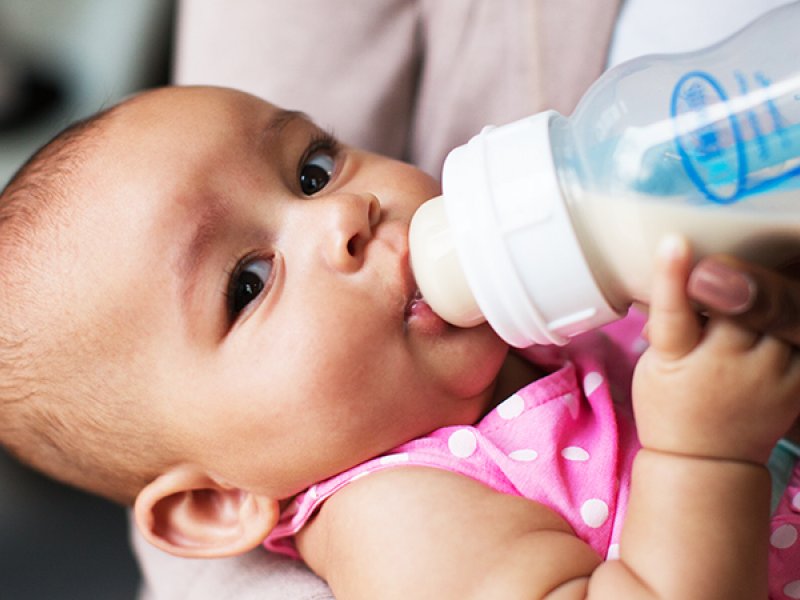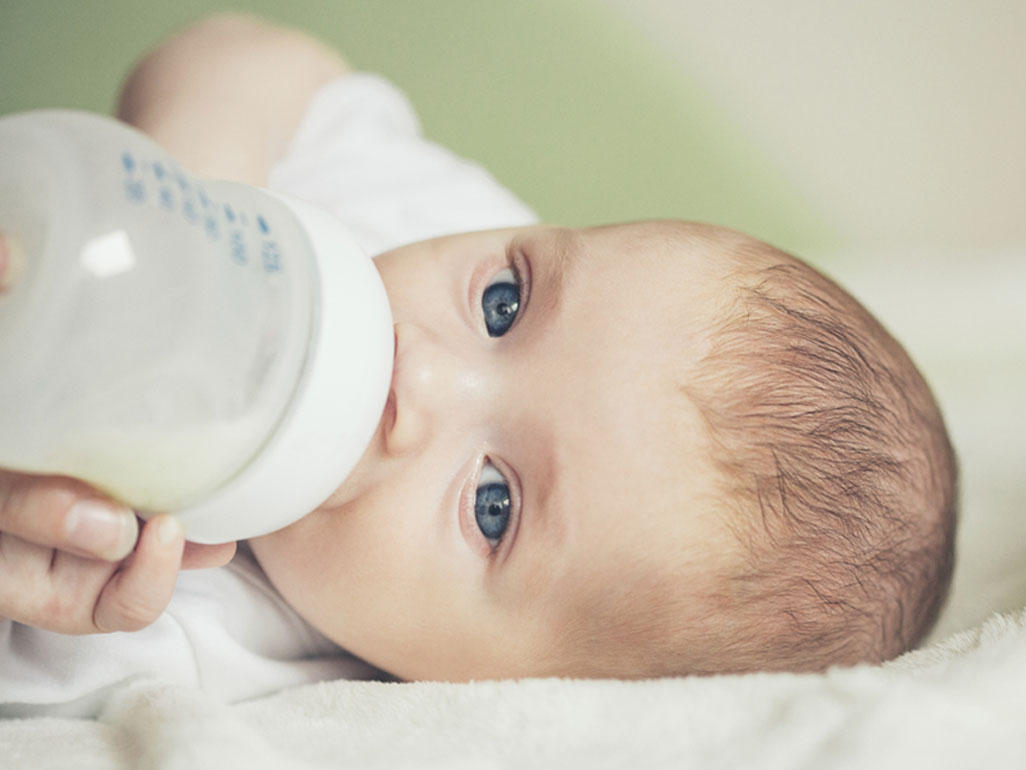
In this article we consider an important child's question - feeding. Namely, we will tell about the mode of feeding the child with breasts and a mixture.
The content of the article
The set routine of the day, including the alternation of sleep and wake, walks and bathing, and the number of food intakes is very important for an adult, and for a newborn - and is vital. After all, all organism systems should work clearly, complementing each other, which is the main condition for the normal development of the child and its good health.
Feeding mode babies
If the baby wakes up at about the same time, then he eats on time and with appetite, because it is by the time of meals to eat his stomach already begins to produce the necessary enzymes and gastric juice for digestion. The kid, a wreath regularly, begins to gain weight and develops according to age criteria.
Baby feeding on the established temporary scheme has several advantages, among which:
- Obvious use for digestion (the whole system also begins to work "like a clock")
- Psychological comfort for crumbs (he is pleasant daily repetitive actions whose chronology he remembers)
- Layout "Reflex discipline" in the future (when in kindergarten and school will need to eat on the schedule)
- Simplify the lives of the most adults (the feeding process does not need to organize and track again).

Feed kid
In general, the power mode is a rather individual concept, which is calculated by the pediatrician, depending on the weight of the baby, the need for the number of applicable food and appetite. In the process of the development of crumbs, he will constantly change.
Children's doctor will explain what kind of power is needed by your child. It will depend on the weight of the child, his appetite, the schedule of his sleep and the need for food. A children's doctor will help you to establish such a regime that will satisfy you and your child. Next, we will discuss only general nutrition principles.
- Newborn child age up to six months exists exclusively in its biological clock - it is necessary to breastfeed it when he wants it.
- It is said that he sleeps with breaks for food. The fact is that maternal milk is a wonderful substance that does not only contain the entire spectrum of nutrients necessary for the baby, but also very easily digested in the gastrointestinal tract.
- That is, get ready for several times during the night to get up to your baby - he will most likely require additives! It is considered the norm, if the infants initially feeds to 12 times a day, leaving gaps for 2-3 hours (mainly for sleep). By the way, experts categorically do not recommend wakeful to feeding: wants to eat - he wakes up and confidently remind themselves about himself!

Gv
An argument, the child will start to eat more, but less often, while the intervals between meals will gradually increase.
- If your baby is on an artificial feed or focusing, then in this case feeding mode Much tougher: up to 8 times a day at intervals from three to three and a half hours. The fact is that the finished mixtures are not so easily absorbed by crumbs like breast milk. Specialists advise try not to feed "artificials" at night - if, of course, your baby will agree to it.
- The behavior of the newborn, his mood, sleep duration and health status directly depend on nutrition. The kid who gets nutrients in insufficient quantities will proceed to scream in the literal sense until the afternoon and day and night. If this happens, then be sure to consult a pediatrician: it may be necessary for additional lures.
The food is one of the most important pleasures in the life of newborns, right in the process of milk sucking it can fall asleep. It is important to understand that the child stops to eat when completely satisfied, so it does not need to insist that he ate more.

Important moments
Do not be afraid if immediately after the kid appears slightly "will lose weight" - in this case, weight loss occurs naturally, because, firstly, the power system is completely rebuilt (differs from intrauterine), and secondly - there is a small dehydration, when Which is the shortage of water is easily replenished by the foster of the baby.
Features of the regime with breastfeeding
As practice shows, the decision on the frequency of breastfeeding and the duration of such "sessions" takes the mother of the kid, based on the needs of his crumbs. After all, the child appears on the light with the already laid temperament: cholerics eat very quickly, and melancholics - slowly, savoring every sip.
About the sense of hunger The newborn can signal in various ways:
- anxiety
- sucking and licking fingers
- shampling
- loud cry
During active development (for 7-10 days after birth, the 4-6 and 12th week of life) appetite, as a rule, the baby increases and the baby requires food more often and much more actively.
So, the mode of infants during breastfeeding, the following:
- After arriving from the maternity hospital - every 3 hour kid will want to eat. There are rare cases when the crumb eats every 4 hours. That is, mom will feed Chado about 7 times a day.
- Sometimes kids give to sleep by mom at night and do not ask to eat from midnight at least 6 in the morning, that is, they skip one meal.
- After a while, the child is already constantly asking to eat after 4 hours. After the first morning feeding, this time can stretch as much as 5-6 hours, especially if the crumb did not eat at night. So overnight, mommy gathers a lot of nutrient milk, which gives the baby well enough.
If the baby asks to eat every 2 hours, then this is a disturbing bell - mom may not have enough milk or it is not nutritious. Already in the first month of life, the magnitude of the milk consumption in the baby - 500-600 g / day.

Feeding kid
Inexperienced young mothers are often worried: will they have enough milk if the baby requires the breast very often? Doctors reassure: This magic substance will be produced in sufficient quantity, as in a fairy tale about a magic pot, who always prepared so much porridge as required. So nature took care that children with different appetites and at all stages of their development can fully satisfy their food needs.
An interesting point: breast milk is not a completely homogeneous substance, as many have accustomed to count. At the beginning of feeding there is a degreased, low-calorie liquid, and after a few minutes the body of mommies, having received an appropriate pulse, begins to produce a more fat, nutrient substance. Knowing such a physiological feature, mommies are trying to breastfeeding as long as possible. Ideally, this process should last about an hour.
Features of the regime for artificial feeding
If, when breastfeeding, the mother's body "reasonable" adds to milk the necessary baby substances and calories into milk, then with artificial feeding, the whole procedure should be monitored by adults.
It is believed that on average, the baby consumes 120 ml of the mixture in each meal (8-meal diet). As it was already noted earlier, for such kids, the regime is very important, since the digestive system of artificials is much more difficult to cope with food (no matter how high-quality and expensive mixes!). Therefore, newborns are fed no earlier than two and a half hours after the last session of food intake, and at the age of one month - no earlier than in three hours.
Try to keep your baby to eaten for one sitting as much as possible - then the feeling of hunger will he notice later. Especially this rule concerns the last evening feeding so that the intestine is at least a six-hour break for recreation.

Eat a mixture
If the baby wakes up at night, try to give him a pacifier or a bottle with a water (tea or juice, if it is already an adult enough for such drinks). Maybe he simply lacks a sucking activity, from which he falls asleep easier than from the indication and parental persuasion. Or the baby missed mom, and he needs to pay a little attention, to climb and burn. And perhaps he has any health problems - in this case, it follows the recommendations to contact the pediatrician.
Jumping in newborns after feeding: normal or deviation?
Each baby when drinking fluid swallows air, which accumulates in the stomach and creates discomfort. Sometimes they ourselves tighten the surplus air, and in some cases children should help.
Holding the baby under the back, put it on your knees and light massaging movements stroke the tummy. Or, take it to the hands vertically, placing my head on my shoulder (it is better to apply a napkin to her), and pat on the back. Someone will immediately break off the air, and for some we will have to repeatedly repeat the procedure.

Put the column
Each child grows and develops according to an individual program, but there are general rules, in which the weight gain should occur. On average, during the first five months of life, the baby becomes twice as harder - from 3.5 to 7 kg. If the newborn appeared very large, it will add much slower in weight - it is absolutely normal.
